30/9/18 26th Sunday in Ordinary Time
 First Reading Numbers 11:25-29
First Reading Numbers 11:25-29
The Lord came down in the Cloud. He spoke with Moses, but took some of the spirit that was on him and put it on the seventy elders. When the spirit came on them they prophesied, but not again.
Two men had stayed back in the camp; one was called Eldad and the other Medad. The spirit came down on them; though they had not gone to the Tent, their names were enrolled among the rest. These began to prophesy in the camp. The young man ran to tell this to Moses, ‘Look,’ he said ‘Eldad and Medad are prophesying in the camp.’ Then said Joshua the son of Nun, who had served Moses from his youth, ‘My Lord Moses, stop them!’ Moses answered him, ‘Are you jealous on my account? If only the whole people of the Lord were prophets, and the Lord gave his Spirit to them all!’
Second Reading James 5:1-6
An answer for the rich. Start crying, weep for the miseries that are coming to you. Your wealth is all rotting, your clothes are all eaten up by moths. All your gold and your silver are corroding away, and the same corrosion will be your own sentence, and eat into your body. It was a burning fire that you stored up as your treasure for the last days. Labourers mowed your fields, and you cheated them – listen to the wages that you kept back, calling out; realise that the cries of the reapers have reached the ears of the Lord of hosts. On earth you have had a life of comfort and luxury; in the time of slaughter you went on eating to your heart’s content. It was you who condemned the innocent and killed them; they offered you no resistance.
Gospel Mark 9:38-43,45,47-48
John said to Jesus, ‘Master, we saw a man who is not one of us casting out devils in your name; and because he was not one of us we tried to stop him.’ But Jesus said, ‘You must not stop him: no one who works a miracle in my name is likely to speak evil of me. Anyone who is not against us is for us. ‘If anyone gives you a cup of water to drink just because you belong to Christ, then I tell you solemnly, he will most certainly not lose his reward. ‘But anyone who is an obstacle to bring down one of these little ones who have faith, would be better thrown into the sea with a great millstone round his neck. And if your hand should cause you to sin, cut it off; it is better for you to enter into life crippled, than to have two hands and go to hell, into the fire that cannot be put out. And if your foot should cause you to sin, cut it off; it is better for you to enter into life lame, than to have two feet and be thrown into hell. And if your eye should cause you to sin, tear it out; it is better for you to enter into the kingdom of God with one eye, than to have two eyes and be thrown into hell where their worm does not die nor their fire go out.’
29/9/18 Saints Michael, Gabriel and Raphael, Archangels
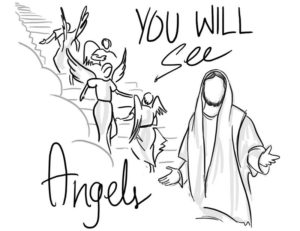 First Reading Apocalypse 12:7-12
First Reading Apocalypse 12:7-12
Now war broke out in heaven, when Michael with his angels attacked the dragon. The dragon fought back with his angels, but they were defeated and driven out of heaven. The great dragon, the primeval serpent, known as the devil or Satan, who had deceived all the world, was hurled down to the earth and his angels were hurled down with him. Then I heard a voice shout from heaven, ‘Victory and power and empire for ever have been won by our God, and all authority for his Christ, now that the persecutor, who accused our brothers day and night before our God, has been brought down. They have triumphed over him by the blood of the Lamb and by the witness of their martyrdom, because even in the face of death they would not cling to life. Let the heavens rejoice and all who live there.’
Gospel John 1:47-51
When Jesus saw Nathanael coming he said of him, ‘There is an Israelite who deserves the name, incapable of deceit.’ ‘How do you know me?’ said Nathanael. ‘Before Philip came to call you,’ said Jesus ‘I saw you under the fig tree.’ Nathanael answered, ‘Rabbi, you are the Son of God, you are the King of Israel.’ Jesus replied, ‘You believe that just because I said: I saw you under the fig tree. You will see greater things than that.’ And then he added ‘I tell you most solemnly, you will see heaven laid open and, above the Son of Man, the angels of God ascending and descending.’
28/9/18 Friday of week 25 in Ordinary Time
 First Reading Ecclesiastes 3:1-11
First Reading Ecclesiastes 3:1-11
There is a season for everything, a time for every occupation under heaven: A time for giving birth, a time for dying; a time for planting, a time for uprooting what has been planted. A time for killing, a time for healing; a time for knocking down, a time for building. A time for tears, a time for laughter; a time for mourning, a time for dancing. A time for throwing stones away, a time for gathering them up; a time for embracing, a time to refrain from embracing. A time for searching, a time for losing; a time for keeping, a time for throwing away. A time for tearing, a time for sewing; a time for keeping silent, a time for speaking. A time for loving, a time for hating; a time for war, a time for peace. What does a man gain for the efforts that he makes? I contemplate the task that God gives mankind to labour at. All that he does is apt for its time; but though he has permitted man to consider time in its wholeness, man cannot comprehend the work of God from beginning to end.
Gospel Luke 9:18-22
One day when Jesus was praying alone in the presence of his disciples he put this question to them, ‘Who do the crowds say I am?’ And they answered, ‘John the Baptist; others Elijah; and others say one of the ancient prophets come back to life.’ ‘But you,’ he said ‘who do you say I am?’ It was Peter who spoke up. ‘The Christ of God’ he said. But he gave them strict orders not to tell anyone anything about this. ‘The Son of Man’ he said ‘is destined to suffer grievously, to be rejected by the elders and chief priests and scribes and to be put to death, and to be raised up on the third day.’
27/9/18 Thursday of week 25 in Ordinary Time
 First Reading Ecclesiastes 1:2-11
First Reading Ecclesiastes 1:2-11
Vanity of vanities, the Preacher says. Vanity of vanities. Vanity of vanities. All is vanity! For all his toil, his toil under the sun, what does man gain by it?
A generation goes, a generation comes, yet the earth stands firm for ever. The sun rises, the sun sets; then to its place it speeds and there it rises. Southward goes the wind, then turns to the north; it turns and turns again; back then to its circling goes the wind. Into the sea all the rivers go, and yet the sea is never filled, and still to their goal the rivers go. All things are wearisome. No man can say that eyes have not had enough of seeing, ears their fill of hearing. What was will be again; what has been done will be done again; and there is nothing new under the sun. Take anything of which it may be said, ‘Look now, this is new.’ Already, long before our time, it existed. Only no memory remains of earlier times, just as in times to come next year itself will not be remembered.
Gospel Luke 9:7-9
Herod the tetrarch had heard about all that was being done by Jesus; and he was puzzled, because some people were saying that John had risen from the dead, others that Elijah had reappeared, still others that one of the ancient prophets had come back to life. But Herod said, ‘John? I beheaded him. So who is this I hear such reports about?’ And he was anxious to see Jesus.
26/9/18 Wednesday of week 25 in Ordinary Time
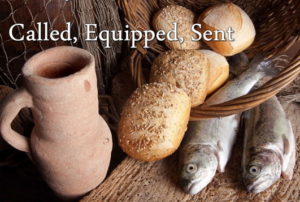 First Reading Proverbs 30:5-9
First Reading Proverbs 30:5-9
Every word of God is unalloyed, he is the shield of those who take refuge in him. To his words make no addition, lest he reprove you and know you for a fraud. Two things I beg of you, do not grudge me them before I die: keep falsehood and lies far from me, give me neither poverty nor riches, grant me only my share of bread to eat, for fear that surrounded by plenty, I should fall away and say, ‘the Lord – who is the Lord?’ or else, in destitution, take to stealing and profane the name of my God.
Gospel Luke 9:1-6
Jesus called the Twelve together and gave them power and authority over all devils and to cure diseases, and he sent them out to proclaim the kingdom of God and to heal. He said to them, ‘Take nothing for the journey: neither staff, nor haversack, nor bread, nor money; and let none of you take a spare tunic. Whatever house you enter, stay there; and when you leave, let it be from there. As for those who do not welcome you, when you leave their town shake the dust from your feet as a sign to them.’ So they set out and went from village to village proclaiming the Good News and healing everywhere.
25/9/18 Tuesday of week 25 in Ordinary Time
 First Reading Proverbs 21:1-6,10-13
First Reading Proverbs 21:1-6,10-13
Like flowing water is the heart of the king in the hand of the Lord, who turns it where he pleases. A man’s conduct may strike him as upright, the Lord, however, weighs the heart. To act virtuously and with justice is more pleasing to the Lord than sacrifice. Haughty eye, proud heart, lamp of the wicked, nothing but sin. The hardworking man is thoughtful, and all is gain; too much haste, and all that comes of it is want. To make a fortune with the help of a lying tongue, such the idle fantasy of those who look for death. The wicked man’s soul is intent on evil, he looks on his neighbour with dislike. When a mocker is punished, the ignorant man grows wiser, when a wise man is instructed he acquires more knowledge. The Just One watches the house of the wicked: he hurls the wicked to destruction. He who shuts his ear to the poor man’s cry shall himself plead and not be heard.
Gospel Luke 8:19-21
The mother and the brothers of Jesus came looking for him, but they could not get to him because of the crowd. He was told, ‘Your mother and brothers are standing outside and want to see you.’ But he said in answer, ‘My mother and my brothers are those who hear the word of God and put it into practice.’
24/9/18 Monday of week 25 in Ordinary Time
 First Reading Proverbs 3:27-34
First Reading Proverbs 3:27-34
My son, do not refuse a kindness to anyone who begs it, if it is in your power to perform it. Do not say to your neighbour, ‘Go away! Come another time! I will give it you tomorrow’, if you can do it now. Do not plot harm against your neighbour as he lives unsuspecting next door. Do not pick a groundless quarrel with a man who has done you no harm. Do not emulate the man of violence, never model your conduct on his; for the wilful wrong-doer is abhorrent to the Lord, who confides only in honest men. The Lord’s curse lies on the house of the wicked, but he blesses the home of the virtuous. He mocks those who mock, but accords his favour to the humble.
Gospel Luke 8:16-18
Jesus said to the crowds: ‘No one lights a lamp to cover it with a bowl or to put it under a bed. No, he puts it on a lamp-stand so that people may see the light when they come in. For nothing is hidden but it will be made clear, nothing secret but it will be known and brought to light. So take care how you hear; for anyone who has will be given more; from anyone who has not, even what he thinks he has will be taken away.’
23/9/18 25th Sunday in Ordinary Time
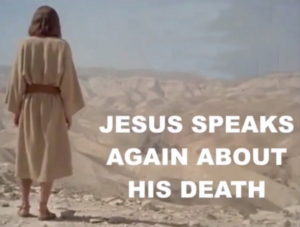 First Reading Wisdom 2:12,17-20
First Reading Wisdom 2:12,17-20
The godless say to themselves: ‘Let us lie in wait for the virtuous man, since he annoys us and opposes our way of life, reproaches us for our breaches of the law and accuses us of playing false to our upbringing. ‘Let us see if what he says is true, let us observe what kind of end he himself will have. If the virtuous man is God’s son, God will take his part and rescue him from the clutches of his enemies. Let us test him with cruelty and with torture, and thus explore this gentleness of his and put his endurance to the proof. Let us condemn him to a shameful death since he will be looked after – we have his word for it.’
Second Reading James 3:16-4:3
Wherever you find jealousy and ambition, you find disharmony, and wicked things of every kind being done; whereas the wisdom that comes down from above is essentially something pure; it also makes for peace, and is kindly and considerate; it is full of compassion and shows itself by doing good; nor is there any trace of partiality or hypocrisy in it. Peacemakers, when they work for peace, sow the seeds which will bear fruit in holiness.
Where do these wars and battles between yourselves first start? Isn’t it precisely in the desires fighting inside your own selves? You want something and you haven’t got it; so you are prepared to kill. You have an ambition that you cannot satisfy; so you fight to get your way by force. Why you don’t have what you want is because you don’t pray for it; when you do pray and don’t get it, it is because you have not prayed properly, you have prayed for something to indulge your own desires.
Gospel Mark 9:30-37
Jesus and his disciples made their way through Galilee; and he did not want anyone to know, because he was instructing his disciples; he was telling them, ‘The Son of Man will be delivered into the hands of men; they will put him to death; and three days after he has been put to death he will rise again.’ But they did not understand what he said and were afraid to ask him. They came to Capernaum, and when he was in the house he asked them, ‘What were you arguing about on the road?’ They said nothing because they had been arguing which of them was the greatest. So he sat down, called the Twelve to him and said, ‘If anyone wants to be first, he must make himself last of all and servant of all.’ He then took a little child, set him in front of them, put his arms round him, and said to them, ‘Anyone who welcomes one of these little children in my name, welcomes me; and anyone who welcomes me welcomes not me but the one who sent me.’
21/9/18 Saint Matthew
 First Reading Ephesians 4:1-7,11-13
First Reading Ephesians 4:1-7,11-13
I, the prisoner in the Lord, implore you to lead a life worthy of your vocation. Bear with one another charitably, in complete selflessness, gentleness and patience. Do all you can to preserve the unity of the Spirit by the peace that binds you together. There is one Body, one Spirit, just as you were all called into one and the same hope when you were called. There is one Lord, one faith, one baptism, and one God who is Father of all, over all, through all and within all.
Each one of us, however, has been given his own share of grace, given as Christ allotted it. To some, his gift was that they should be apostles; to some, prophets; to some, evangelists; to some, pastors and teachers; so that the saints together make a unity in the work of service, building up the body of Christ. In this way we are all to come to unity in our faith and in our knowledge of the Son of God, until we become the perfect Man, fully mature with the fullness of Christ himself.
Gospel Matthew 9:9-13
As Jesus was walking on, he saw a man named Matthew sitting by the customs house, and he said to him, ‘Follow me.’ And he got up and followed him. While he was at dinner in the house it happened that a number of tax collectors and sinners came to sit at the table with Jesus and his disciples. When the Pharisees saw this, they said to his disciples, ‘Why does your master eat with tax collectors and sinners?’ When he heard this he replied, ‘It is not the healthy who need the doctor, but the sick. Go and learn the meaning of the words: What I want is mercy, not sacrifice. And indeed I did not come to call the virtuous, but sinners.’
20/9/18 Thursday of week 24 in Ordinary Time
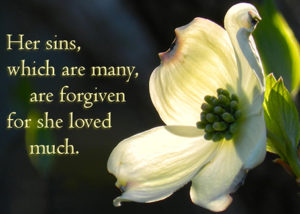 First Reading 1 Corinthians 15:1-11
First Reading 1 Corinthians 15:1-11
Brothers, I want to remind you of the gospel I preached to you, the gospel that you received and in which you are firmly established; because the gospel will save you only if you keep believing exactly what I preached to you – believing anything else will not lead to anything. Well then, in the first place, I taught you what I had been taught myself, namely that Christ died for our sins, in accordance with the scriptures; that he was buried; and that he was raised to life on the third day, in accordance with the scriptures; that he appeared first to Cephas and secondly to the Twelve. Next he appeared to more than five hundred of the brothers at the same time, most of whom are still alive, though some have died; then he appeared to James, and then to all the apostles; and last of all he appeared to me too; it was as though I was born when no one expected it.
I am the least of the apostles; in fact, since I persecuted the Church of God, I hardly deserve the name apostle; but by God’s grace that is what I am, and the grace that he gave me has not been fruitless. On the contrary, I, or rather the grace of God that is with me, have worked harder than any of the others; but what matters is that I preach what they preach, and this is what you all believed.
Gospel Luke 7:36-50
One of the Pharisees invited Jesus to a meal. When he arrived at the Pharisee’s house and took his place at table, a woman came in, who had a bad name in the town. She had heard he was dining with the Pharisee and had brought with her an alabaster jar of ointment. She waited behind him at his feet, weeping, and her tears fell on his feet, and she wiped them away with her hair; then she covered his feet with kisses and anointed them with the ointment. When the Pharisee who had invited him saw this, he said to himself, ‘If this man were a prophet, he would know who this woman is that is touching him and what a bad name she has.’ Then Jesus took him up and said, ‘Simon, I have something to say to you.’ ‘Speak, Master’ was the reply. ‘There was once a creditor who had two men in his debt; one owed him five hundred denarii, the other fifty. They were unable to pay, so he pardoned them both. Which of them will love him more?’ ‘The one who was pardoned more, I suppose’ answered Simon. Jesus said, ‘You are right.’ Then he turned to the woman. ‘Simon,’ he said ‘you see this woman? I came into your house, and you poured no water over my feet, but she has poured out her tears over my feet and wiped them away with her hair. You gave me no kiss, but she has been covering my feet with kisses ever since I came in. You did not anoint my head with oil, but she has anointed my feet with ointment. For this reason I tell you that her sins, her many sins, must have been forgiven her, or she would not have shown such great love. It is the man who is forgiven little who shows little love.’ Then he said to her, ‘Your sins are forgiven.’ Those who were with him at table began to say to themselves, ‘Who is this man, that he even forgives sins?’ But he said to the woman, ‘Your faith has saved you; go in peace.’
19/9/18 Wednesday of week 24 in Ordinary Time
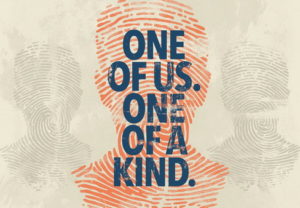 First Reading 1 Corinthians 12:31-13:13
First Reading 1 Corinthians 12:31-13:13
First Reading Be ambitious for the higher gifts. And I am going to show you a way that is better than any of them. If I have all the eloquence of men or of angels, but speak without love, I am simply a gong booming or a cymbal clashing. If I have the gift of prophecy, understanding all the mysteries there are, and knowing everything, and if I have faith in all its fullness, to move mountains, but without love, then I am nothing at all. If I give away all that I possess, piece by piece, and if I even let them take my body to burn it, but am without love, it will do me no good whatever. Love is always patient and kind; it is never jealous; love is never boastful or conceited; it is never rude or selfish; it does not take offence, and is not resentful. Love takes no pleasure in other people’s sins but delights in the truth; it is always ready to excuse, to trust, to hope, and to endure whatever comes. Love does not come to an end. But if there are gifts of prophecy, the time will come when they must fail; or the gift of languages, it will not continue for ever; and knowledge – for this, too, the time will come when it must fail. For our knowledge is imperfect and our prophesying is imperfect; but once perfection comes, all imperfect things will disappear. When I was a child, I used to talk like a child, and think like a child, and argue like a child, but now I am a man, all childish ways are put behind me. Now we are seeing a dim reflection in a mirror; but then we shall be seeing face to face. The knowledge that I have now is imperfect; but then I shall know as fully as I am known. In short, there are three things that last: faith, hope and love; and the greatest of these is love.
Gospel Luke 7:31-35
Jesus said to the people: ‘What description can I find for the men of this generation? What are they like? They are like children shouting to one another while they sit in the market-place: ‘“We played the pipes for you, and you wouldn’t dance; we sang dirges, and you wouldn’t cry.” ‘For John the Baptist comes, not eating bread, not drinking wine, and you say, “He is possessed.” The Son of Man comes, eating and drinking, and you say, “Look, a glutton and a drunkard, a friend of tax collectors and sinners.” Yet Wisdom has been proved right by all her children.’
18/9/18 Tuesday of week 24 in Ordinary Time
 First Reading 1 Corinthians 12:12-14,27-31
First Reading 1 Corinthians 12:12-14,27-31
Just as a human body, though it is made up of many parts, is a single unit because all these parts, though many, make one body, so it is with Christ. In the one Spirit we were all baptised, Jews as well as Greeks, slaves as well as citizens, and one Spirit was given to us all to drink.
Nor is the body to be identified with any one of its many parts. Now you together are Christ’s body; but each of you is a different part of it. In the Church, God has given the first place to apostles, the second to prophets, the third to teachers; after them, miracles, and after them the gift of healing; helpers, good leaders, those with many languages. Are all of them apostles, or all of them prophets, or all of them teachers? Do they all have the gift of miracles, or all have the gift of healing? Do all speak strange languages, and all interpret them? Be ambitious for the higher gifts.
Gospel Luke 7:11-17
Jesus went to a town called Nain, accompanied by his disciples and a great number of people. When he was near the gate of the town it happened that a dead man was being carried out for burial, the only son of his mother, and she was a widow. And a considerable number of the townspeople were with her. When the Lord saw her he felt sorry for her. ‘Do not cry’ he said. Then he went up and put his hand on the bier and the bearers stood still, and he said, ‘Young man, I tell you to get up.’ And the dead man sat up and began to talk, and Jesus gave him to his mother. Everyone was filled with awe and praised God saying, ‘A great prophet has appeared among us; God has visited his people.’ And this opinion of him spread throughout Judaea and all over the countryside.
17/9/18 Monday of week 24 in Ordinary Time
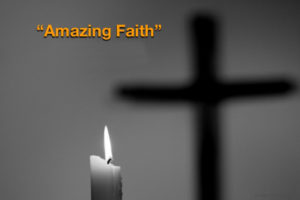 First Reading 1 Corinthians 11:17-26,33
First Reading 1 Corinthians 11:17-26,33
On the subject of instructions, I cannot say that you have done well in holding meetings that do you more harm than good. In the first place, I hear that when you all come together as a community, there are separate factions among you, and I half believe it – since there must no doubt be separate groups among you, to distinguish those who are to be trusted. The point is, when you hold these meetings, it is not the Lord’s Supper that you are eating, since when the time comes to eat, everyone is in such a hurry to start his own supper that one person goes hungry while another is getting drunk. Surely you have homes for eating and drinking in? Surely you have enough respect for the community of God not to make poor people embarrassed? What am I to say to you? Congratulate you? I cannot congratulate you on this.
For this is what I received from the Lord, and in turn passed on to you: that on the same night that he was betrayed, the Lord Jesus took some bread, and thanked God for it and broke it, and he said, ‘This is my body, which is for you; do this as a memorial of me.’ In the same way he took the cup after supper, and said, ‘This cup is the new covenant in my blood. Whenever you drink it, do this as a memorial of me.’ Until the Lord comes, therefore, every time you eat this bread and drink this cup, you are proclaiming his death, So to sum up, my dear brothers, when you meet for the Meal, wait for one another.
Gospel Luke 7:1-10
When Jesus had come to the end of all he wanted the people to hear, he went into Capernaum. A centurion there had a servant, a favourite of his, who was sick and near death. Having heard about Jesus he sent some Jewish elders to him to ask him to come and heal his servant. When they came to Jesus they pleaded earnestly with him. ‘He deserves this of you’ they said ‘because he is friendly towards our people; in fact, he is the one who built the synagogue.’ So Jesus went with them, and was not very far from the house when the centurion sent word to him by some friends: ‘Sir,’ he said ‘do not put yourself to trouble; because I am not worthy to have you under my roof; and for this same reason I did not presume to come to you myself; but give the word and let my servant be cured. For I am under authority myself, and have soldiers under me; and I say to one man: Go, and he goes; to another: Come here, and he comes; to my servant: Do this, and he does it.’ When Jesus heard these words he was astonished at him and, turning round, said to the crowd following him, ‘I tell you, not even in Israel have I found faith like this.’ And when the messengers got back to the house they found the servant in perfect health.
16/9/18 24th Sunday in Ordinary Time
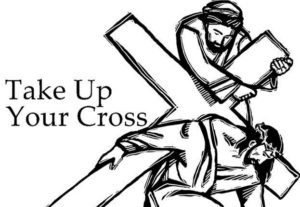 First Reading Isaiah 50:5-9
First Reading Isaiah 50:5-9
The Lord has opened my ear. For my part, I made no resistance, neither did I turn away. I offered my back to those who struck me, my cheeks to those who tore at my beard; I did not cover my face against insult and spittle. The Lord comes to my help, so that I am untouched by the insults. So, too, I set my face like flint; I know I shall not be shamed. My vindicator is here at hand. Does anyone start proceedings against me? Then let us go to court together. Who thinks he has a case against me? Let him approach me. The Lord is coming to my help, who will dare to condemn me?
Second Reading James 2:14-18
Take the case, my brothers, of someone who has never done a single good act but claims that he has faith. Will that faith save him? If one of the brothers or one of the sisters is in need of clothes and has not enough food to live on, and one of you says to them, ‘I wish you well; keep yourself warm and eat plenty’, without giving them these bare necessities of life, then what good is that? Faith is like that: if good works do not go with it, it is quite dead. This is the way to talk to people of that kind: ‘You say you have faith and I have good deeds; I will prove to you that I have faith by showing you my good deeds – now you prove to me that you have faith without any good deeds to show.’
Gospel Mark 8:27-35
Jesus and his disciples left for the villages round Caesarea Philippi. On the way he put this question to his disciples, ‘Who do people say I am?’ And they told him. ‘John the Baptist,’ they said ‘others Elijah; others again, one of the prophets.’ ‘But you,’ he asked ‘who do you say I am?’ Peter spoke up and said to him, ‘You are the Christ.’ And he gave them strict orders not to tell anyone about him. And he began to teach them that the Son of Man was destined to suffer grievously, to be rejected by the elders and the chief priests and the scribes, and to be put to death, and after three days to rise again; and he said all this quite openly. Then, taking him aside, Peter started to remonstrate with him. But, turning and seeing his disciples, he rebuked Peter and said to him, ‘Get behind me, Satan! Because the way you think is not God’s way but man’s.’ He called the people and his disciples to him and said, ‘If anyone wants to be a follower of mine, let him renounce himself and take up his cross and follow me. For anyone who wants to save his life will lose it; but anyone who loses his life for my sake, and for the sake of the gospel, will save it.’
15/9/18 Saturday of week 23 in Ordinary Time
 First Reading 1 Corinthians 10:14-22
First Reading 1 Corinthians 10:14-22
My dear brothers, you must keep clear of idolatry. I say to you as sensible people: judge for yourselves what I am saying. The blessing-cup that we bless is a communion with the blood of Christ, and the bread that we break is a communion with the body of Christ. The fact that there is only one loaf means that, though there are many of us, we form a single body because we all have a share in this one loaf. Look at the other Israel, the race, where those who eat the sacrifices are in communion with the altar. Does this mean that the food sacrificed to idols has a real value, or that the idol itself is real? Not at all. It simply means that the sacrifices that they offer they sacrifice to demons who are not God. I have no desire to see you in communion with demons. You cannot drink the cup of the Lord and the cup of demons. You cannot take your share at the table of the Lord and at the table of demons. Do we want to make the Lord angry; are we stronger than he is?
Gospel John 19:25-27
Near the cross of Jesus stood his mother and his mother’s sister, Mary the wife of Clopas, and Mary of Magdala. Seeing his mother and the disciple he loved standing near her, Jesus said to his mother, ‘Woman, this is your son.’ Then to the disciple he said, ‘This is your mother.’ And from that moment the disciple made a place for her in his home.
14/9/18 The Exaltation of the Holy Cross
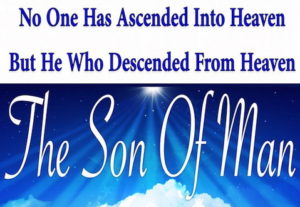 First Reading Numbers 21:4-9
First Reading Numbers 21:4-9
On the way through the wilderness the people lost patience. They spoke against God and against Moses, ‘Why did you bring us out of Egypt to die in this wilderness? For there is neither bread nor water here; we are sick of this unsatisfying food.’
At this God sent fiery serpents among the people; their bite brought death to many in Israel. The people came and said to Moses, ‘We have sinned by speaking against the Lord and against you. Intercede for us with the Lord to save us from these serpents.’ Moses interceded for the people, and the Lord answered him, ‘Make a fiery serpent and put it on a standard. If anyone is bitten and looks at it, he shall live.’ So Moses fashioned a bronze serpent which he put on a standard, and if anyone was bitten by a serpent, he looked at the bronze serpent and lived.
Gospel John 3:13-17
Jesus said to Nicodemus: ‘No one has gone up to heaven except the one who came down from heaven, the Son of Man who is in heaven; and the Son of Man must be lifted up as Moses lifted up the serpent in the desert, so that everyone who believes may have eternal life in him. Yes, God loved the world so much that he gave his only Son, so that everyone who believes in him may not be lost but may have eternal life. For God sent his Son into the world not to condemn the world, but so that through him the world might be saved.’
13/9/18 Thursday of week 23 in Ordinary Time
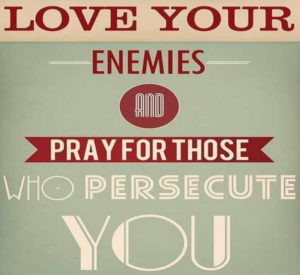 First Reading 1 Corinthians 8:1-7,11-13
First Reading 1 Corinthians 8:1-7,11-13
Now about food sacrificed to idols. ‘We all have knowledge’; yes, that is so, but knowledge gives self-importance – it is love that makes the building grow. A man may imagine he understands something, but still not understand anything in the way that he ought to. But any man who loves God is known by him. Well then, about eating food sacrificed to idols: we know that idols do not really exist in the world and that there is no god but the One. And even if there were things called gods, either in the sky or on earth – where there certainly seem to be ‘gods’ and ‘lords’ in plenty – still for us there is one God, the Father, from whom all things come and for whom we exist; and there is one Lord, Jesus Christ, through whom all things come and through whom we exist.
Some people, however, do not have this knowledge. There are some who have been so long used to idols that they eat this food as though it really had been sacrificed to the idol, and their conscience, being weak, is defiled by it. In this way your knowledge could become the ruin of someone weak, of a brother for whom Christ died. By sinning in this way against your brothers, and injuring their weak consciences, it would be Christ against whom you sinned. That is why, since food can be the occasion of my brother’s downfall, I shall never eat meat again in case I am the cause of a brother’s downfall.
Gospel Luke 6:27-38
Jesus said to his disciples: ‘I say this to you who are listening: Love your enemies, do good to those who hate you, bless those who curse you, pray for those who treat you badly. To the man who slaps you on one cheek, present the other cheek too; to the man who takes your cloak from you, do not refuse your tunic. Give to everyone who asks you, and do not ask for your property back from the man who robs you. Treat others as you would like them to treat you. If you love those who love you, what thanks can you expect? Even sinners love those who love them. And if you do good to those who do good to you, what thanks can you expect? For even sinners do that much. And if you lend to those from whom you hope to receive, what thanks can you expect? Even sinners lend to sinners to get back the same amount. Instead, love your enemies and do good, and lend without any hope of return. You will have a great reward, and you will be sons of the Most High, for he himself is kind to the ungrateful and the wicked. ‘Be compassionate as your Father is compassionate. Do not judge, and you will not be judged yourselves; do not condemn, and you will not be condemned yourselves; grant pardon, and you will be pardoned. Give, and there will be gifts for you: a full measure, pressed down, shaken together, and running over, will be poured into your lap; because the amount you measure out is the amount you will be given back.’
12/9/18 Wednesday of week 23 in Ordinary Time
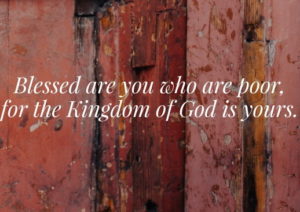 First Reading 1 Corinthians 7:25-31
First Reading 1 Corinthians 7:25-31
About remaining celibate, I have no directions from the Lord but give my own opinion as one who, by the Lord’s mercy, has stayed faithful. Well then, I believe that in these present times of stress this is right: that it is good for a man to stay as he is. If you are tied to a wife, do not look for freedom; if you are free of a wife, then do not look for one. But if you marry, it is no sin, and it is not a sin for a young girl to get married. They will have their troubles, though, in their married life, and I should like to spare you that. Brothers, this is what I mean: our time is growing short. Those who have wives should live as though they had none, and those who mourn should live as though they had nothing to mourn for; those who are enjoying life should live as though there were nothing to laugh about; those whose life is buying things should live as though they had nothing of their own; and those who have to deal with the world should not become engrossed in it. I say this because the world as we know it is passing away.
Gospel Luke 6:20-26
Fixing his eyes on his disciples Jesus said: ‘How happy are you who are poor: yours is the kingdom of God. Happy you who are hungry now: you shall be satisfied. Happy you who weep now: you shall laugh. Happy are you when people hate you, drive you out, abuse you, denounce your name as criminal, on account of the Son of Man. Rejoice when that day comes and dance for joy, for then your reward will be great in heaven. This was the way their ancestors treated the prophets. ‘But alas for you who are rich: you are having your consolation now. Alas for you who have your fill now: you shall go hungry. Alas for you who laugh now: you shall mourn and weep. ‘Alas for you when the world speaks well of you! This was the way their ancestors treated the false prophets.’
11/9/18 Tuesday of week 23 in Ordinary Time
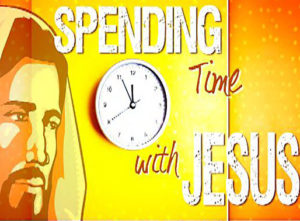 First Reading 1 Corinthians 6:1-11
First Reading 1 Corinthians 6:1-11
How dare one of your members take up a complaint against another in the law courts of the unjust instead of before the saints? As you know, it is the saints who are to ‘judge the world’; and if the world is to be judged by you, how can you be unfit to judge trifling cases? Since we are also to judge angels, it follows that we can judge matters of everyday life; but when you have had cases of that kind, the people you appointed to try them were not even respected in the Church. You should be ashamed: is there really not one reliable man among you to settle differences between brothers and so one brother brings a court case against another in front of unbelievers? It is bad enough for you to have lawsuits at all against one another: oughtn’t you to let yourselves be wronged, and let yourselves be cheated? But you are doing the wronging and the cheating, and to your own brothers.
You know perfectly well that people who do wrong will not inherit the kingdom of God: people of immoral lives, idolaters, adulterers, catamites, sodomites, thieves, usurers, drunkards, slanderers and swindlers will never inherit the kingdom of God. These are the sort of people some of you were once, but now you have been washed clean, and sanctified, and justified through the name of the Lord Jesus Christ and through the Spirit of our God.
Gospel Luke 6:12-19
Jesus went out into the hills to pray; and he spent the whole night in prayer to God. When day came he summoned his disciples and picked out twelve of them; he called them ‘apostles’: Simon whom he called Peter, and his brother Andrew; James, John, Philip, Bartholomew, Matthew, Thomas, James son of Alphaeus, Simon called the Zealot, Judas son of James, and Judas Iscariot who became a traitor. He then came down with them and stopped at a piece of level ground where there was a large gathering of his disciples with a great crowd of people from all parts of Judaea and from Jerusalem and from the coastal region of Tyre and Sidon who had come to hear him and to be cured of their diseases. People tormented by unclean spirits were also cured, and everyone in the crowd was trying to touch him because power came out of him that cured them all.
10/9/18 Monday of week 23 in Ordinary Time
 First Reading 1 Corinthians 5:1-8
First Reading 1 Corinthians 5:1-8
I have been told as an undoubted fact that one of you is living with his father’s wife. This is a case of sexual immorality among you that must be unparalleled even among pagans. How can you be so proud of yourselves? You should be in mourning. A man who does a thing like that ought to have been expelled from the community. Though I am far away in body, I am with you in spirit, and have already condemned the man who did this thing as if I were actually present. When you are assembled together in the name of the Lord Jesus, and I am spiritually present with you, then with the power of our Lord Jesus he is to be handed over to Satan so that his sensual body may be destroyed and his spirit saved on the day of the Lord.
The pride that you take in yourselves is hardly to your credit. You must know how even a small amount of yeast is enough to leaven all the dough, so get rid of all the old yeast, and make yourselves into a completely new batch of bread, unleavened as you are meant to be. Christ, our passover, has been sacrificed; let us celebrate the feast, then, by getting rid of all the old yeast of evil and wickedness, having only the unleavened bread of sincerity and truth.
Gospel Luke 6:6-11
On the sabbath Jesus went into the synagogue and began to teach, and a man was there whose right hand was withered. The scribes and the Pharisees were watching him to see if he would cure a man on the sabbath, hoping to find something to use against him. But he knew their thoughts; and he said to the man with the withered hand, ‘Stand up! Come out into the middle.’ And he came out and stood there. Then Jesus said to them, ‘I put it to you: is it against the law on the sabbath to do good, or to do evil; to save life, or to destroy it?’ Then he looked round at them all and said to the man, ‘Stretch out your hand.’ He did so, and his hand was better. But they were furious, and began to discuss the best way of dealing with Jesus.
9/9/18 23rd Sunday in Ordinary Time
 First Reading Isaiah 35:4-7
First Reading Isaiah 35:4-7
Say to all faint hearts, ‘Courage! Do not be afraid. Look, your God is coming, vengeance is coming, the retribution of God; he is coming to save you.’ Then the eyes of the blind shall be opened, the ears of the deaf unsealed, then the lame shall leap like a deer and the tongues of the dumb sing for joy; for water gushes in the desert, streams in the wasteland, the scorched earth becomes a lake, the parched land springs of water.
Second Reading James 2:1-5
My brothers, do not try to combine faith in Jesus Christ, our glorified Lord, with the making of distinctions between classes of people. Now suppose a man comes into your synagogue, beautifully dressed and with a gold ring on, and at the same time a poor man comes in, in shabby clothes, and you take notice of the well-dressed man, and say, ‘Come this way to the best seats’; then you tell the poor man, ‘Stand over there’ or ‘You can sit on the floor by my foot-rest.’ Can’t you see that you have used two different standards in your mind, and turned yourselves into judges, and corrupt judges at that? Listen, my dear brothers: it was those who are poor according to the world that God chose, to be rich in faith and to be the heirs to the kingdom which he promised to those who love him.
Gospel Mark 7:31-37
Returning from the district of Tyre, Jesus went by way of Sidon towards the Sea of Galilee, right through the Decapolis region. And they brought him a deaf man who had an impediment in his speech; and they asked him to lay his hand on him. He took him aside in private, away from the crowd, put his fingers into the man’s ears and touched his tongue with spittle. Then looking up to heaven he sighed; and he said to him, ‘Ephphatha’, that is, ‘Be opened.’ And his ears were opened, and the ligament of his tongue was loosened and he spoke clearly. And Jesus ordered them to tell no one about it, but the more he insisted, the more widely they published it. Their admiration was unbounded. ‘He has done all things well,’ they said ‘he makes the deaf hear and the dumb speak.’
8/9/18 The Birthday of the Blessed Virgin Mary
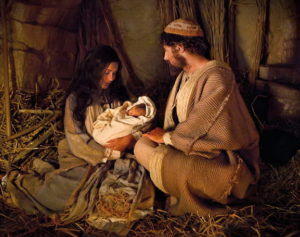 First Reading Micah 5:1-4
First Reading Micah 5:1-4
The Lord says this: But you, Bethlehem Ephrathah, the least of the clans of Judah, out of you will be born for me the one who is to rule over Israel; his origin goes back to the distant past, to the days of old. The Lord is therefore going to abandon them till the time when she who is to give birth gives birth. Then the remnant of his brothers will come back to the sons of Israel. He will stand and feed his flock with the power of the Lord, with the majesty of the name of his God. They will live secure, for from then on he will extend his power to the ends of the land. He himself will be peace.
Gospel Matthew 1:1-16,18-23
A genealogy of Jesus Christ, son of David, son of Abraham: Abraham was the father of Isaac, Isaac the father of Jacob, Jacob the father of Judah and his brothers, Judah was the father of Perez and Zerah, Tamar being their mother, Perez was the father of Hezron, Hezron the father of Ram, Ram was the father of Amminadab, Amminadab the father of Nahshon, Nahshon the father of Salmon, Salmon was the father of Boaz, Rahab being his mother, Boaz was the father of Obed, Ruth being his mother, Obed was the father of Jesse; and Jesse was the father of King David. David was the father of Solomon, whose mother had been Uriah’s wife, Solomon was the father of Rehoboam, Rehoboam the father of Abijah, Abijah the father of Asa, Asa was the father of Jehoshaphat, Jehoshaphat the father of Joram, Joram the father of Azariah, Azariah was the father of Jotham, Jotham the father of Ahaz, Ahaz the father of Hezekiah, Hezekiah was the father of Manasseh, Manasseh the father of Amon, Amon the father of Josiah; and Josiah was the father of Jechoniah and his brothers. Then the deportation to Babylon took place. After the deportation to Babylon: Jechoniah was the father of Shealtiel, Shealtiel the father of Zerubbabel, Zerubbabel was the father of Abiud, Abiud the father of Eliakim, Eliakim the father of Azor, Azor was the father of Zadok, Zadok the father of Achim, Achim the father of Eliud, Eliud was the father of Eleazar, Eleazar the father of Matthan, Matthan the father of Jacob; and Jacob was the father of Joseph the husband of Mary; of her was born Jesus who is called Christ. This is how Jesus Christ came to be born. His mother Mary was betrothed to Joseph; but before they came to live together she was found to be with child through the Holy Spirit. Her husband Joseph; being a man of honour and wanting to spare her publicity, decided to divorce her informally. He had made up his mind to do this when the angel of the Lord appeared to him in a dream and said, ‘Joseph son of David, do not be afraid to take Mary home as your wife, because she has conceived what is in her by the Holy Spirit. She will give birth to a son and you must name him Jesus, because he is the one who is to save his people from their sins.’ Now all this took place to fulfil the words spoken by the Lord through the prophet: The virgin will conceive and give birth to a son and they will call him Emmanuel, a name which means ‘God-is-with-us.’
7/9/18 Friday of week 22 in Ordinary Time
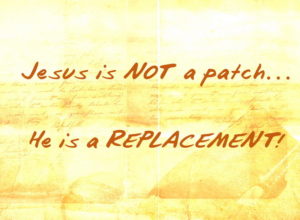 First Reading 1 Corinthians 4:1-5
First Reading 1 Corinthians 4:1-5 People must think of us as Christ’s servants, stewards entrusted with the mysteries of God. What is expected of stewards is that each one should be found worthy of his trust. Not that it makes the slightest difference to me whether you, or indeed any human tribunal, find me worthy or not. I will not even pass judgement on myself. True, my conscience does not reproach me at all, but that does not prove that I am acquitted: the Lord alone is my judge. There must be no passing of premature judgement. Leave that until the Lord comes; he will light up all that is hidden in the dark and reveal the secret intentions of men’s hearts. Then will be the time for each one to have whatever praise he deserves, from God.
Gospel Luke 5:33-39
The Pharisees and the scribes said to Jesus, ‘John’s disciples are always fasting and saying prayers, and the disciples of the Pharisees too, but yours go on eating and drinking.’ Jesus replied, ‘Surely you cannot make the bridegroom’s attendants fast while the bridegroom is still with them? But the time will come, the time for the bridegroom to be taken away from them; that will be the time when they will fast.’ He also told them this parable, ‘No one tears a piece from a new cloak to put it on an old cloak; if he does, not only will he have torn the new one, but the piece taken from the new will not match the old. ‘And nobody puts new wine into old skins; if he does, the new wine will burst the skins and then run out, and the skins will be lost. No; new wine must be put into fresh skins. And nobody who has been drinking old wine wants new. “The old is good” he says.’
6/9/18 Thursday of week 22 in Ordinary Time
 First Reading 1 Corinthians 3:18-23
First Reading 1 Corinthians 3:18-23Make no mistake about it: if any one of you thinks of himself as wise, in the ordinary sense of the word, then he must learn to be a fool before he really can be wise. Why? Because the wisdom of this world is foolishness to God. As scripture says: The Lord knows wise men’s thoughts: he knows how useless they are; or again: God is not convinced by the arguments of the wise. So there is nothing to boast about in anything human: Paul, Apollos, Cephas, the world, life and death, the present and the future, are all your servants; but you belong to Christ and Christ belongs to God.
Gospel Luke 5:1-11
Jesus was standing one day by the Lake of Gennesaret, with the crowd pressing round him listening to the word of God, when he caught sight of two boats close to the bank. The fishermen had gone out of them and were washing their nets. He got into one of the boats – it was Simon’s – and asked him to put out a little from the shore. Then he sat down and taught the crowds from the boat. When he had finished speaking he said to Simon, ‘Put out into deep water and pay out your nets for a catch.’ ‘Master,’ Simon replied, ‘we worked hard all night long and caught nothing, but if you say so, I will pay out the nets.’ And when they had done this they netted such a huge number of fish that their nets began to tear, so they signalled to their companions in the other boat to come and help them; when these came, they filled the two boats to sinking point. When Simon Peter saw this he fell at the knees of Jesus saying, ‘Leave me, Lord; I am a sinful man.’ For he and all his companions were completely overcome by the catch they had made; so also were James and John, sons of Zebedee, who were Simon’s partners. But Jesus said to Simon, ‘Do not be afraid; from now on it is men you will catch.’ Then, bringing their boats back to land, they left everything and followed him.
5/9/18 Wednesday of week 22 in Ordinary Time
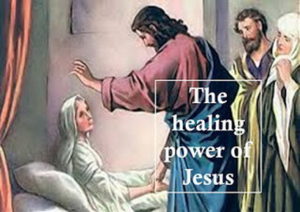 First Reading 1 Corinthians 3:1-9
First Reading 1 Corinthians 3:1-9Brothers, I myself was unable to speak to you as people of the Spirit: I treated you as sensual men, still infants in Christ. What I fed you with was milk, not solid food, for you were not ready for it; and indeed, you are still not ready for it since you are still unspiritual. Isn’t that obvious from all the jealousy and wrangling that there is among you, from the way that you go on behaving like ordinary people? What could be more unspiritual than your slogans, ‘I am for Paul’ and ‘I am for Apollos’? After all, what is Apollos and what is Paul? They are servants who brought the faith to you. Even the different ways in which they brought it were assigned to them by the Lord. I did the planting, Apollos did the watering, but God made things grow. Neither the planter nor the waterer matters: only God, who makes things grow. It is all one who does the planting and who does the watering, and each will duly be paid according to his share in the work. We are fellow workers with God; you are God’s farm, God’s building.
Gospel Luke 4:38-44
Leaving the synagogue, Jesus went to Simon’s house. Now Simon’s mother-in-law was suffering from a high fever and they asked him to do something for her. Leaning over her he rebuked the fever and it left her. And she immediately got up and began to wait on them. At sunset all those who had friends suffering from diseases of one kind or another brought them to him, and laying his hands on each he cured them. Devils too came out of many people, howling, ‘You are the Son of God.’ But he rebuked them and would not allow them to speak because they knew that he was the Christ. When daylight came he left the house and made his way to a lonely place. The crowds went to look for him, and when they had caught up with him they wanted to prevent him leaving them, but he answered, ‘I must proclaim the Good News of the kingdom of God to the other towns too, because that is what I was sent to do.’ And he continued his preaching in the synagogues of Judaea.
4/9/18 Tuesday of the Twenty-second Week in Ordinary Time
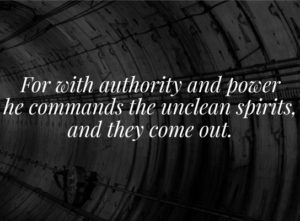 Reading 1 1 COR 2:10B-16
Reading 1 1 COR 2:10B-16Brothers and sisters: The Spirit scrutinizes everything, even the depths of God. Among men, who knows what pertains to the man except his spirit that is within? Similarly, no one knows what pertains to God except the Spirit of God. We have not received the spirit of the world but the Spirit who is from God, so that we may understand the things freely given us by God. And we speak about them not with words taught by human wisdom, but with words taught by the Spirit, describing spiritual realities in spiritual terms. Now the natural man does not accept what pertains to the Spirit of God, for to him it is foolishness, and he cannot understand it, because it is judged spiritually. The one who is spiritual, however, can judge everything but is not subject to judgment by anyone. For “who has known the mind of the Lord, so as to counsel him?” But we have the mind of Christ.
Gospel LK 4:31-37
Jesus went down to Capernaum, a town of Galilee. He taught them on the sabbath, and they were astonished at his teaching because he spoke with authority. In the synagogue there was a man with the spirit of an unclean demon, and he cried out in a loud voice, “What have you to do with us, Jesus of Nazareth? Have you come to destroy us? I know who you are–the Holy One of God!” Jesus rebuked him and said, “Be quiet! Come out of him!” Then the demon threw the man down in front of them and came out of him without doing him any harm. They were all amazed and said to one another, “What is there about his word? For with authority and power he commands the unclean spirits, and they come out.” And news of him spread everywhere in the surrounding region.
3/9/18 Monday 22nd Week in Ordinary Time
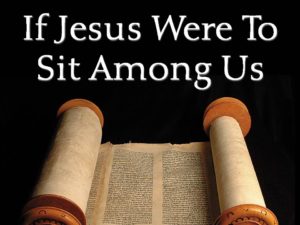 First Reading 1 Corinthians 2:1-5
First Reading 1 Corinthians 2:1-5When I came to you, brothers and sisters, proclaiming the mystery of God, I did not come with sublimity of words or of wisdom. For I resolved to know nothing while I was with you except Jesus Christ, and him crucified. I came to you in weakness and fear and much trembling, and my message and my proclamation were not with persuasive words of wisdom, but with a demonstration of spirit and power, so that your faith might rest not on human wisdom but on the power of God.
Gospel Luke 4:16-30
Jesus came to Nazareth, where he had grown up, and went according to his custom into the synagogue on the sabbath day. He stood up to read and was handed a scroll of the prophet Isaiah. He unrolled the scroll and found the passage where it was written: The Spirit of the Lord is upon me, because he has anointed me to bring glad tidings to the poor. He has sent me to proclaim liberty to captives and recovery of sight to the blind, to let the oppressed go free, and to proclaim a year acceptable to the Lord. Rolling up the scroll, he handed it back to the attendant and sat down, and the eyes of all in the synagogue looked intently at him. He said to them, “Today this Scripture passage is fulfilled in your hearing.” And all spoke highly of him and were amazed at the gracious words that came from his mouth. They also asked, “Is this not the son of Joseph?” He said to them, “Surely you will quote me this proverb, ‘Physician, cure yourself,’ and say, ‘Do here in your native place the things that we heard were done in Capernaum.'” And he said, “Amen, I say to you, no prophet is accepted in his own native place. Indeed, I tell you, there were many widows in Israel in the days of Elijah when the sky was closed for three and a half years and a severe famine spread over the entire land. It was to none of these that Elijah was sent, but only to a widow in Zarephath in the land of Sidon. Again, there were many lepers in Israel during the time of Elisha the prophet; yet not one of them was cleansed, but only Naaman the Syrian.” When the people in the synagogue heard this, they were all filled with fury. They rose up, drove him out of the town, and led him to the brow of the hill on which their town had been built, to hurl him down headlong. But he passed through the midst of them and went away.
2/9/18 22nd Sunday in Ordinary Time
 First Reading Deuteronomy 4:1-2,6-8
First Reading Deuteronomy 4:1-2,6-8Moses said to the people: ‘Now, Israel, take notice of the laws and customs that I teach you today, and observe them, that you may have life and may enter and take possession of the land that the Lord the God of your fathers is giving you. You must add nothing to what I command you, and take nothing from it, but keep the commandments of the Lord your God just as I lay them down for you. Keep them, observe them, and they will demonstrate to the peoples your wisdom and understanding. When they come to know of all these laws they will exclaim, “No other people is as wise and prudent as this great nation.” And indeed, what great nation is there that has its gods so near as the Lord our God is to us whenever we call to him? And what great nation is there that has laws and customs to match this whole Law that I put before you today?’
Second Reading James 1:17-18,21-22,27
It is all that is good, everything that is perfect, which is given us from above; it comes down from the Father of all light; with him there is no such thing as alteration, no shadow of a change. By his own choice he made us his children by the message of the truth so that we should be a sort of first-fruits of all that he had created. Accept and submit to the word which has been planted in you and can save your souls. But you must do what the word tells you, and not just listen to it and deceive yourselves. Pure, unspoilt religion, in the eyes of God our Father is this: coming to the help of orphans and widows when they need it, and keeping oneself uncontaminated by the world.
Gospel Mark 7:1-8,14-15,21-23
The Pharisees and some of the scribes who had come from Jerusalem gathered round Jesus, and they noticed that some of his disciples were eating with unclean hands, that is, without washing them. For the Pharisees, and the Jews in general, follow the tradition of the elders and never eat without washing their arms as far as the elbow; and on returning from the market place they never eat without first sprinkling themselves. There are also many other observances which have been handed down to them concerning the washing of cups and pots and bronze dishes. So these Pharisees and scribes asked him, ‘Why do your disciples not respect the tradition of the elders but eat their food with unclean hands?’ He answered, ‘It was of you hypocrites that Isaiah so rightly prophesied in this passage of scripture: This people honours me only with lip-service, while their hearts are far from me. The worship they offer me is worthless, the doctrines they teach are only human regulations. You put aside the commandment of God to cling to human traditions.’ He called the people to him again and said, ‘Listen to me, all of you, and understand. Nothing that goes into a man from outside can make him unclean; it is the things that come out of a man that make him unclean. For it is from within, from men’s hearts, that evil intentions emerge: fornication, theft, murder, adultery, avarice, malice, deceit, indecency, envy, slander, pride, folly. All these evil things come from within and make a man unclean.’
1/9/18 Saturday of week 21 in Ordinary Time
 First Reading 1 Corinthians 1:26-31
First Reading 1 Corinthians 1:26-31Take yourselves for instance, brothers, at the time when you were called: how many of you were wise in the ordinary sense of the word, how many were influential people, or came from noble families? No, it was to shame the wise that God chose what is foolish by human reckoning, and to shame what is strong that he chose what is weak by human reckoning; those whom the world thinks common and contemptible are the ones that God has chosen – those who are nothing at all to show up those who are everything. The human race has nothing to boast about to God, but you, God has made members of Christ Jesus and by God’s doing he has become our wisdom, and our virtue, and our holiness, and our freedom. As scripture says: if anyone wants to boast, let him boast about the Lord.
Gospel Matthew 25:14-30 Jesus spoke this parable to his disciples: ‘The kingdom of Heaven is like a man on his way abroad who summoned his servants and entrusted his property to them. To one he gave five talents, to another two, to a third one; each in proportion to his ability. Then he set out. ‘The man who had received the five talents promptly went and traded with them and made five more. The man who had received two made two more in the same way. But the man who had received one went off and dug a hole in the ground and hid his master’s money. ‘Now a long time after, the master of those servants came back and went through his accounts with them. The man who had received the five talents came forward bringing five more. “Sir,” he said “you entrusted me with five talents; here are five more that I have made.” ‘His master said to him, “Well done, good and faithful servant; you have shown you can be faithful in small things, I will trust you with greater; come and join in your master’s happiness.” ‘Next the man with the two talents came forward. “Sir,” he said “you entrusted me with two talents; here are two more that I have made.” His master said to him, “Well done, good and faithful servant; you have shown you can be faithful in small things, I will trust you with greater; come and join in your master’s happiness.” ‘Last came forward the man who had the one talent. “Sir,” said he “I had heard you were a hard man, reaping where you have not sown and gathering where you have not scattered; so I was afraid, and I went off and hid your talent in the ground. Here it is; it was yours, you have it back.” But his master answered him, “You wicked and lazy servant! So you knew that I reap where I have not sown and gather where I have not scattered? Well then, you should have deposited my money with the bankers, and on my return I would have recovered my capital with interest. So now, take the talent from him and give it to the man who has the five talents. For to everyone who has will be given more, and he will have more than enough; but from the man who has not, even what he has will be taken away. As for this good-for-nothing servant, throw him out into the dark, where there will be weeping and grinding of teeth.”’
 First Reading Numbers 11:25-29
First Reading Numbers 11:25-29 First Reading Apocalypse 12:7-12
First Reading Apocalypse 12:7-12 First Reading Ecclesiastes 3:1-11
First Reading Ecclesiastes 3:1-11  First Reading Ecclesiastes 1:2-11
First Reading Ecclesiastes 1:2-11 First Reading Proverbs 30:5-9
First Reading Proverbs 30:5-9 First Reading Proverbs 21:1-6,10-13
First Reading Proverbs 21:1-6,10-13 First Reading Proverbs 3:27-34
First Reading Proverbs 3:27-34 First Reading Wisdom 2:12,17-20
First Reading Wisdom 2:12,17-20 First Reading Ephesians 4:1-7,11-13
First Reading Ephesians 4:1-7,11-13 First Reading 1 Corinthians 15:1-11
First Reading 1 Corinthians 15:1-11 First Reading 1 Corinthians 12:31-13:13
First Reading 1 Corinthians 12:31-13:13 First Reading 1 Corinthians 12:12-14,27-31
First Reading 1 Corinthians 12:12-14,27-31 First Reading 1 Corinthians 11:17-26,33
First Reading 1 Corinthians 11:17-26,33 First Reading Isaiah 50:5-9
First Reading Isaiah 50:5-9  First Reading 1 Corinthians 10:14-22
First Reading 1 Corinthians 10:14-22 First Reading Numbers 21:4-9
First Reading Numbers 21:4-9 First Reading 1 Corinthians 8:1-7,11-13
First Reading 1 Corinthians 8:1-7,11-13 First Reading 1 Corinthians 7:25-31
First Reading 1 Corinthians 7:25-31  First Reading 1 Corinthians 6:1-11
First Reading 1 Corinthians 6:1-11 First Reading 1 Corinthians 5:1-8
First Reading 1 Corinthians 5:1-8 First Reading Isaiah 35:4-7
First Reading Isaiah 35:4-7  First Reading Micah 5:1-4
First Reading Micah 5:1-4 First Reading 1 Corinthians 4:1-5
First Reading 1 Corinthians 4:1-5  First Reading 1 Corinthians 3:18-23
First Reading 1 Corinthians 3:18-23 First Reading 1 Corinthians 3:1-9
First Reading 1 Corinthians 3:1-9 Reading 1 1 COR 2:10B-16
Reading 1 1 COR 2:10B-16 First Reading 1 Corinthians 2:1-5
First Reading 1 Corinthians 2:1-5 First Reading Deuteronomy 4:1-2,6-8
First Reading Deuteronomy 4:1-2,6-8 First Reading 1 Corinthians 1:26-31
First Reading 1 Corinthians 1:26-31